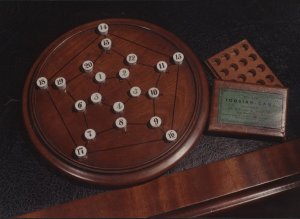Presented By: Nineteenth Century Forum
Characterization and Combination
Lecture by Andrea Henderson, Professor of English at UC Irvine

Professor Henderson's talk will explore the power of combinatorics—a popular subfield of Victorian mathematics—to illuminate the structure of late Victorian characterization, focusing particularly on Dickens’s Our Mutual Friend. It will show that there is a good historical reason why, in the words of a contemporary reviewer, the characters of this novel could be described as “a number of automatons moving about,” “tattooed with various characteristics”: nodes in a social network, they are the literary
embodiment of a conception of personhood as mobile, extrinsically defined, and combinatory. Characters in these novels are not the fundamental units of social meaning that earlier nineteenth-century novelistic protocols would lead us to expect but are instead like atoms in a compound or letters in a word; they form variable combinations with others, and it’s the combinations that matter. Henderson will show that this focus on clusters of people rather than singular individuals has its historical grounding in the logic of late Victorian capitalism, an abstract logic of ramifying networks in which meaning and value inhere less in particular people or things than in their links to other people and things. As we will see, that logic is epitomized in combinatorics, the study of network ramification. Henderson argues that combinatorics is in fact the mathematical subfield of late Victorian capitalism: it both reflects and reinforces a logic of abstraction, combination, and expansion. It is fitting then that Dickens implements this logic in the “character system” of Our Mutual Friend, his great novel on finance capitalism. This novel, as the title suggests, is devoted to understanding persons in terms of networks, which it represents as the ethically suspect framework of finance capitalism.
Professor Henderson's research centers in nineteenth-century British culture. She is particularly interested in exploring formal similarities between literary arts, visual arts, and sciences. Her most recent book, Algebraic Art: Mathematical Formalism and Victorian Culture (Oxford: Oxford University Press, 2018), traces the influence of mathematical formalism on Victorian literature and visual art. Other recent articles include “The Physics and Poetry of Analogy” (Victorian Studies 56:3, Spring 2014) and “Symbolic Logic and the Logic of Symbolism” (Critical Inquiry 41:1, Autumn 2014).
Professor Henderson received her PhD in English from the University of Pennsylvania in 1991. She was an Associate Professor of English at the University of Michigan from 1997-2003. Her academic distinctions include the following: Guggenheim Fellow (2012-13), ACLS Fellow (2012-13), Michigan Humanities Award (1999), Bredvold Prize (1996), and Michigan Society of Fellows (1991-1994).
Co-sponsorship for this event is generously provided by the Michigan Society of Fellows, the Department of Comparative Literature, and the Institute for the Humanities.
embodiment of a conception of personhood as mobile, extrinsically defined, and combinatory. Characters in these novels are not the fundamental units of social meaning that earlier nineteenth-century novelistic protocols would lead us to expect but are instead like atoms in a compound or letters in a word; they form variable combinations with others, and it’s the combinations that matter. Henderson will show that this focus on clusters of people rather than singular individuals has its historical grounding in the logic of late Victorian capitalism, an abstract logic of ramifying networks in which meaning and value inhere less in particular people or things than in their links to other people and things. As we will see, that logic is epitomized in combinatorics, the study of network ramification. Henderson argues that combinatorics is in fact the mathematical subfield of late Victorian capitalism: it both reflects and reinforces a logic of abstraction, combination, and expansion. It is fitting then that Dickens implements this logic in the “character system” of Our Mutual Friend, his great novel on finance capitalism. This novel, as the title suggests, is devoted to understanding persons in terms of networks, which it represents as the ethically suspect framework of finance capitalism.
Professor Henderson's research centers in nineteenth-century British culture. She is particularly interested in exploring formal similarities between literary arts, visual arts, and sciences. Her most recent book, Algebraic Art: Mathematical Formalism and Victorian Culture (Oxford: Oxford University Press, 2018), traces the influence of mathematical formalism on Victorian literature and visual art. Other recent articles include “The Physics and Poetry of Analogy” (Victorian Studies 56:3, Spring 2014) and “Symbolic Logic and the Logic of Symbolism” (Critical Inquiry 41:1, Autumn 2014).
Professor Henderson received her PhD in English from the University of Pennsylvania in 1991. She was an Associate Professor of English at the University of Michigan from 1997-2003. Her academic distinctions include the following: Guggenheim Fellow (2012-13), ACLS Fellow (2012-13), Michigan Humanities Award (1999), Bredvold Prize (1996), and Michigan Society of Fellows (1991-1994).
Co-sponsorship for this event is generously provided by the Michigan Society of Fellows, the Department of Comparative Literature, and the Institute for the Humanities.